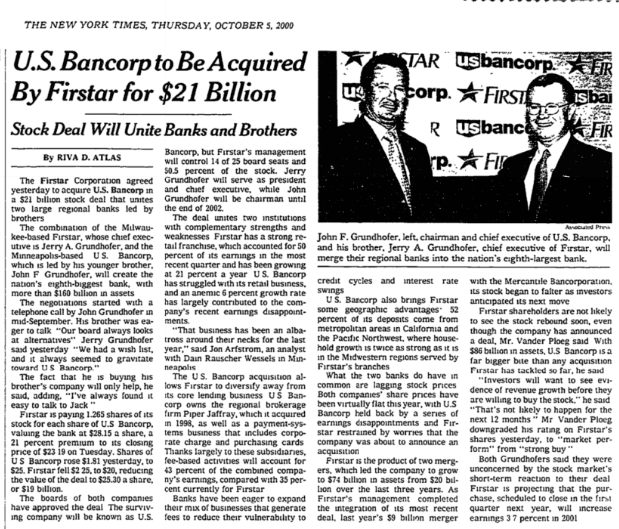
Wanna analyze a bank like a pro?
Here are ten things you'll need to know…
[thread]
Here are ten things you'll need to know…
[thread]
1. Age
New banks are twice as likely to fail as old banks.
A handy benchmark is 100 years old — the median age of a bank in the U.S.
You can find a bank’s age on the FDIC's website here…
banks.data.fdic.gov/bankfind-suite…
New banks are twice as likely to fail as old banks.
A handy benchmark is 100 years old — the median age of a bank in the U.S.
You can find a bank’s age on the FDIC's website here…
banks.data.fdic.gov/bankfind-suite…
2. CEO tenure
Retaining wisdom is essential in a cyclical industry where the same mistakes happen time and again.
A proxy for this is the average tenure of a bank’s CEOs.
$WAFD is a benchmark.
It's had six CEOs since opening in 1917, equaling an average tenure of 17 yrs.
Retaining wisdom is essential in a cyclical industry where the same mistakes happen time and again.
A proxy for this is the average tenure of a bank’s CEOs.
$WAFD is a benchmark.
It's had six CEOs since opening in 1917, equaling an average tenure of 17 yrs.
3. Skin in the game
Bankers perform best when they lend and spend their own money.
It’s good if a bank’s CEO owns ~ 5% of its stock, like $HOMB.
But it’s better if the CEO is the largest shareholder, like $HIFS + $GSBC.
The SEC provides this data...
sec.gov/edgar/searched…
Bankers perform best when they lend and spend their own money.
It’s good if a bank’s CEO owns ~ 5% of its stock, like $HOMB.
But it’s better if the CEO is the largest shareholder, like $HIFS + $GSBC.
The SEC provides this data...
sec.gov/edgar/searched…
4. Deposit share in hometown
A well-run bank will hold 40% or more of the total deposits in its home market.
To get this data, click here and search by city:
www7.fdic.gov/sod/sodMarketB…
A well-run bank will hold 40% or more of the total deposits in its home market.
To get this data, click here and search by city:
www7.fdic.gov/sod/sodMarketB…
5. Efficiency
It's best to assume that efficiency is the only durable competitive advantage in banking.
The benchmark is an efficiency ratio below 50%, though some say 40% is the new 50%.
The FDIC provides this info for all banks in its SDI database...
www7.fdic.gov/sdi/index.asp
It's best to assume that efficiency is the only durable competitive advantage in banking.
The benchmark is an efficiency ratio below 50%, though some say 40% is the new 50%.
The FDIC provides this info for all banks in its SDI database...
www7.fdic.gov/sdi/index.asp
6. Executive pay
The bank CEOs that created the most shareholder value in recent decades — Mick Blodnick at $GBCI and Robert Wilmers at $MTB — ranked in the bottom quartile of their peer groups in terms of pay.
This info is in a bank’s proxy (DEF 14A):
sec.gov/edgar/searched…
The bank CEOs that created the most shareholder value in recent decades — Mick Blodnick at $GBCI and Robert Wilmers at $MTB — ranked in the bottom quartile of their peer groups in terms of pay.
This info is in a bank’s proxy (DEF 14A):
sec.gov/edgar/searched…
7. Profitability
A bank that produces a 14% return on equity (~1.4% return on assets) every year compounds value faster than one that produces a 24% ROE some years and 4% the rest even if the average is the same.
(This is known as variance drain.)
The key is consistency.
A bank that produces a 14% return on equity (~1.4% return on assets) every year compounds value faster than one that produces a 24% ROE some years and 4% the rest even if the average is the same.
(This is known as variance drain.)
The key is consistency.
8. Performance in time of crisis
A simple litmus test for any bank is to check whether it lost money in the most recent financial crisis — in this case, the 2008-09 crisis.
“The first rule of compounding is to never interrupt it unnecessarily,” says Charlie Munger.
A simple litmus test for any bank is to check whether it lost money in the most recent financial crisis — in this case, the 2008-09 crisis.
“The first rule of compounding is to never interrupt it unnecessarily,” says Charlie Munger.
9. Relentless growth
$FFIN doesn’t have the highest valuation in banking — 4.1x book value — because it’s the most profitable bank in America, but rather because its earnings per share (EPS) has increased every year since 1986.
$FFIN doesn’t have the highest valuation in banking — 4.1x book value — because it’s the most profitable bank in America, but rather because its earnings per share (EPS) has increased every year since 1986.
10. Capital allocation
The typical bank allocates roughly a third of its earnings to dividends, a third to buybacks, and a third to organic or external growth.
But what distinguishes the best banks is that they consistently raise, and never cut, their dividend.
END/
The typical bank allocates roughly a third of its earnings to dividends, a third to buybacks, and a third to organic or external growth.
But what distinguishes the best banks is that they consistently raise, and never cut, their dividend.
END/
• • •
Missing some Tweet in this thread? You can try to
force a refresh







